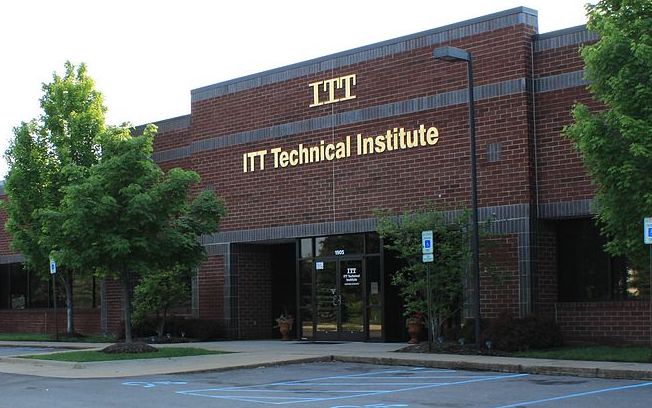The Biden administration announced Tuesday that it would no longer charge students of ITT Technical Institute (ITT) for $3.9 billion in federal student loans.

The move provides relief for loans received between January 1, 2005 and September 2016, when the institute closed, the Department of Education (ED) said in the announcement. It doesn’t require “any additional action” from the borrowers.
“The automatic loan cancellation announced today will provide life-changing relief that has long been owed to former ITT students,” said Rohit Chopra, director of the Consumer Finance Protection Bureau.
The department said that the decision followed Departmental findings based on “extensive internal records, testimony from ITT managers and recruiters, and first-hand accounts from borrowers.”
“It is time for student borrowers to stop shouldering the burden from ITT’s years of lies and false promises,” U.S. Secretary of Education Miguel Cardona said. “The evidence shows that for years, ITT’s leaders intentionally misled students about the quality of their programs in order to profit off federal student loan programs, with no regard for the hardship this would cause.”
The ED said that previous relief granted by the department had discharged $1.9 billion for 130,000 ITT students to date, and that the Biden administration has now provided relief for 1.6 million borrowers.
The department also said that on Monday, it notified DeVry University that the university must pay nearly $24 million for approved borrower defense claims. When a school misleads a student or violates certain state laws, the student may be eligible for some or total relief of federal student loan debt under borrower defense.
The department had approved borrower defense claims in February after finding that “DeVry had repeatedly misled prospective students across the country” between 2008 and 2015.
DeVry claimed that 90 percent of its graduates who actively seek employment received jobs in their field of study within six months of graduation, while the actual rate was around 58 percent, the DE found. The DE anticipates the approval of more student loan discharges as it reviews more applications from former DeVry students.
DeVry can submit information or request a hearing for 20 days after the initial demand, the department said.
“We are in receipt of the notice from the Department and are reviewing it,” said Hessy Fernandez, DeVry’s public relations director, according to the New York Times. “We continue to believe the department mischaracterizes DeVry’s calculation and disclosure of graduate outcomes in certain advertising, and we do not agree with the conclusions they have reached.”
More Stories Like This
Yazzie/Martinez Draft Plan Angers New Mexico Indigenous Education Experts and AdvocatesMorongo Breaks Ground on New Tribal Elementary School
"Power in Culture" Study Reveals Key Drivers of Belonging for Indigenous College Students
Native American All-American Football Game Returns to Vikings Stadium, Adds Girls' Flag Football Clinic
Michigan Relaunches Resource Guide to Support Native American Students
Help us tell the stories that could save Native languages and food traditions
At a critical moment for Indian Country, Native News Online is embarking on our most ambitious reporting project yet: "Cultivating Culture," a three-year investigation into two forces shaping Native community survival—food sovereignty and language revitalization.
The devastating impact of COVID-19 accelerated the loss of Native elders and with them, irreplaceable cultural knowledge. Yet across tribal communities, innovative leaders are fighting back, reclaiming traditional food systems and breathing new life into Native languages. These aren't just cultural preservation efforts—they're powerful pathways to community health, healing, and resilience.
Our dedicated reporting team will spend three years documenting these stories through on-the-ground reporting in 18 tribal communities, producing over 200 in-depth stories, 18 podcast episodes, and multimedia content that amplifies Indigenous voices. We'll show policymakers, funders, and allies how cultural restoration directly impacts physical and mental wellness while celebrating successful models of sovereignty and self-determination.
This isn't corporate media parachuting into Indian Country for a quick story. This is sustained, relationship-based journalism by Native reporters who understand these communities. It's "Warrior Journalism"—fearless reporting that serves the 5.5 million readers who depend on us for news that mainstream media often ignores.
We need your help right now. While we've secured partial funding, we're still $450,000 short of our three-year budget. Our immediate goal is $25,000 this month to keep this critical work moving forward—funding reporter salaries, travel to remote communities, photography, and the deep reporting these stories deserve.
Every dollar directly supports Indigenous journalists telling Indigenous stories. Whether it's $5 or $50, your contribution ensures these vital narratives of resilience, innovation, and hope don't disappear into silence.
 The stakes couldn't be higher. Native languages are being lost at an alarming rate. Food insecurity plagues many tribal communities. But solutions are emerging, and these stories need to be told.
The stakes couldn't be higher. Native languages are being lost at an alarming rate. Food insecurity plagues many tribal communities. But solutions are emerging, and these stories need to be told.
Support independent Native journalism. Fund the stories that matter.
Levi Rickert (Potawatomi), Editor & Publisher

